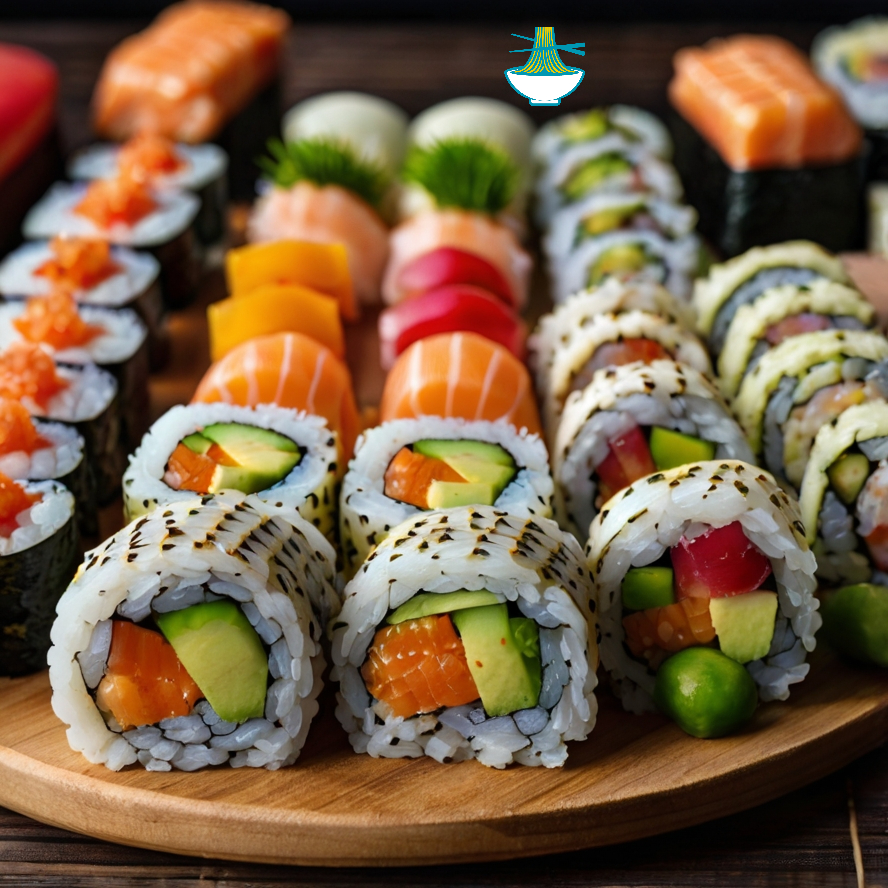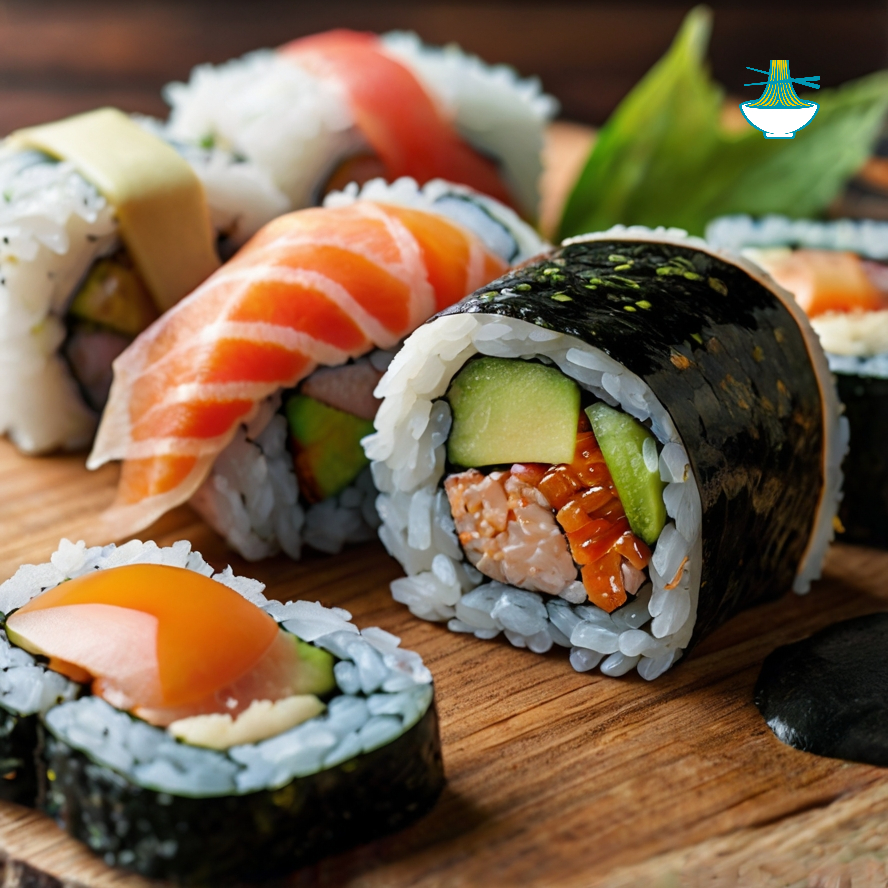Explore the world of Maki, a delightful variety of sushi rolls that are as beautiful as they are delicious. From classic California rolls to adventurous dragon rolls, find your favorite Maki recipes and learn how to make them at home. Whether you're a sushi enthusiast or new to this Japanese culinary art, Maki offers a delightful experience for every palate. Dive into the world of Maki and elevate your sushi game today!
Here's a basic recipe for Maki sushi rolls. Feel free to customize the fillings according to your taste!
Ingredients:
- 2 cups sushi rice
- 2 1/2 cups water
- 1/3 cup rice vinegar
- 2 tablespoons sugar
- 1 teaspoon salt
- Nori (seaweed sheets)
- Fillings of your choice (e.g., cucumber, avocado, crab stick, smoked salmon, tuna)
- Soy sauce, pickled ginger, and wasabi for serving
Instructions:
1- Rinse the sushi rice under cold water until the water runs clear. Drain well.
2- Combine the rice and water in a rice cooker and cook according to the manufacturer's instructions.
3- In a small saucepan, combine the rice vinegar, sugar, and salt. Heat over low heat until the sugar and salt dissolve. Remove from heat and let cool.
4- When the rice is cooked, transfer it to a large bowl and gently fold in the vinegar mixture using a wooden spoon or spatula. Be careful not to mash the rice.
5- Place a sheet of nori on a bamboo sushi mat with the rough side facing up.
6- Wet your hands and take a handful of rice, spreading it evenly over the nori, leaving a small border at the top.
7- Arrange your desired fillings in a line along the bottom edge of the nori.
8- Using the sushi mat, roll the nori tightly over the filling, using your fingers to tuck in the filling as you roll.
9- Wet the top border of the nori with water to seal the roll.
10- Use a sharp knife to slice the roll into 6-8 pieces.
11- Serve the Maki sushi rolls with soy sauce, pickled ginger, and wasabi.
Enjoy your homemade Maki sushi rolls!
Nutritional Values:
Here are the approximate nutritional values for the ingredients used in the previous Maki sushi roll recipe. Keep in mind that the actual values may vary based on specific brands and quantities used:
Sushi Rice (2 cups, cooked):
- Calories: 480
- Carbohydrates: 106g
- Protein: 8g
- Fat: 0g
- Fiber: 2g
benefits: Provides energy due to its carbohydrate content and contains some protein. It's also low in fat and can be a source of fiber if made with whole grain rice.
Nori (seaweed sheets, 1 sheet):
- Calories: 10
- Carbohydrates: 1g
- Protein: 1g
- Fat: 0g
- Fiber: 1g
benefits: Rich in iodine, which is essential for thyroid function. It also contains antioxidants, vitamins, and minerals such as vitamin C, vitamin A, calcium, and iron.
Rice Vinegar (1/3 cup):
- Calories: 20
- Carbohydrates: 0g
- Protein: 0g
- Fat: 0g
- Fiber: 0g
benefits: Contains acetic acid, which may help with digestion and blood sugar control. It also adds flavor to the sushi rice without adding many calories.
Sugar (2 tablespoons):
- Calories: 90
- Carbohydrates: 23g
- Protein: 0g
- Fat: 0g
- Fiber: 0g
benefits: Provides sweetness to the rice vinegar mixture but should be used in moderation due to its high calorie content.
Salt (1 teaspoon):
- Calories: 0
- Carbohydrates: 0g
- Protein: 0g
- Fat: 0g
- Fiber: 0g
benefits: Provides flavor and helps balance the sweetness of the rice vinegar mixture. However, excessive salt intake should be avoided due to its association with high blood pressure.
Cucumber (1 medium):
- Calories: 45
- Carbohydrates: 11g
- Protein: 2g
- Fat: 0g
- Fiber: 2g
benefits:Low in calories and high in water content, making it a refreshing and hydrating ingredient. It also provides some fiber and vitamins.
Avocado (1 medium):
- Calories: 240
- Carbohydrates: 12g
- Protein: 3g
- Fat: 22g
- Fiber: 10g
benefits: High in healthy monounsaturated fats, which are beneficial for heart health. Avocados also contain fiber, vitamins (such as vitamin K, vitamin E, and some B vitamins), and minerals (such as potassium).
Crab Stick (1 stick):
- Calories: 35
- Carbohydrates: 3g
- Protein: 4g
- Fat: 1g
- Fiber: 0g
benefits: Contains protein and is low in fat, making it a good source of lean protein. However, some crab sticks may be high in sodium, so it's important to check the label.
Smoked Salmon (2 ounces):
- Calories: 100
- Carbohydrates: 0g
- Protein: 14g
- Fat: 5g
- Fiber: 0g
benefits: Rich in omega-3 fatty acids, which are beneficial for heart health. It also provides protein, vitamins (such as vitamin D and vitamin B12), and minerals (such as selenium).
Tuna (2 ounces, canned in water):
- Calories: 60
- Carbohydrates: 0g
- Protein: 13g
- Fat: 0g
- Fiber: 0g
benefits: Another good source of lean protein. It also provides omega-3 fatty acids, vitamins (such as vitamin D and vitamin B12), and minerals (such as selenium and iron).
Please note that these values are approximate and can vary based on the specific brands and quantities used.


Comments